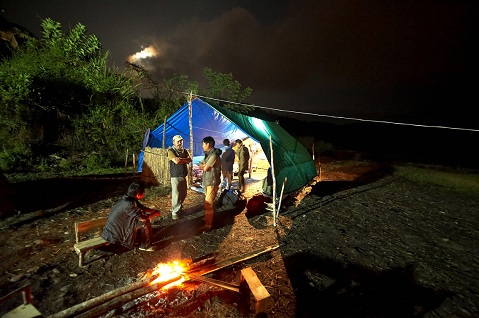Over a month since the migratory Amur falcons’ arrival in Nagaland, not a single bird has been killed in their roosting site in Doyang Reservoir, reports the Amur Falcon Protection Squad (AFPS) – a group of former hunters, who along with the Nagaland Forest Department staff are patrolling these areas to keep the birds safe.
This remarkable turnaround - considering tens of thousands of falcons reportedly hunted last year - was brought about through joint initiatives implemented by the local communities, the Forest Department and NGOs including the Natural Nagas and Wildlife Trust of India (WTI). This includes daily patrol by the Forest Department staff and AFPS along the Doyang reservoir.
“Nagaland is a safe haven for Amur falcons,” declared T Lotha, Chief Wildlife Warden, Nagaland. “This year too, millions have come in the Doyang roosting area, and we have taken appropriate steps to ensure that no killing takes place, working together with various agencies – the local communities, the police, administration, Forest Department and NGOs. And we succeeded.”
WTI and Natural Nagas have been working with the local communities and the Forest Department since November last year, through a sustained Rapid Action Project supported by CAF-India Limited, to help save the falcons.
“Our first initiative was to spread awareness among the local communities on the issue,” said Sunil Kyarong, Regional Head – WTI. “For months, beginning in November last year, numerous meetings and consultations were held with the people of Pangti, Ashaa and Sungro - three villages around the Reservoir, where the birds come to roost.”
These discussions culminated in signing of an agreement between the village councils, Natural Nagas and WTI, in August this year. The village councils accordingly declared hunting of Amur falcons illegal in their jurisdiction, imposing a fine of 5000 rupees for offenders. The creation of the Amur Falcon Protection Squad subsequently followed to assist the Forest Department and the village councils to ensure effective enforcement.
“What we are doing here is being done right at the grass roots, interacting with the people here including hunters and the village council members who are also the representatives of respective groups of public, and in coordination with the Forest Department. The benefits are being given to people who need it and who have supported the conservation of the falcons. This way, we have created a successful model, which we are sure will be replicated in other areas within the state too,” said Ronchamo Shitiri, Chairman of the Pangti village council.
“The villagers are sacrificing their land for the falcons, so we are working to extend the livelihood support,” added Lotha. “This will not happen overnight, as this requires proper planning to ensure that this is sustainable as the birds will return again, and we need to arrange for resources. Once this season is over, we will work on analysing the villages’ strengths and weaknesses and continue our efforts to improve the economic status of the local people, so that the falcons are safe in the coming years too.”


- 8546 reads










Add new comment